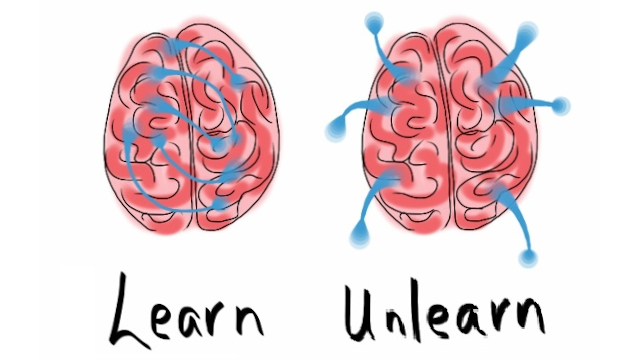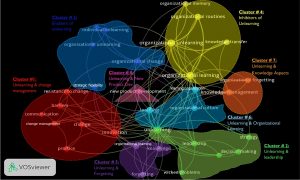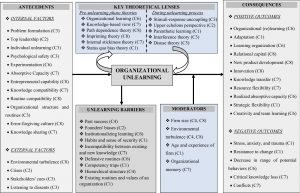
An integrative framework of organizational unlearning
The topic of “organizational unlearning” is attracting increasing interest. As Shubham Sharma and Usha Lenka advise in a newly published paper1 in the journal Review of Managerial Science, as organizations continue to acquire new knowledge, it may be that existing practices, values, or behaviors will have become redundant. This obsolete knowledge can inhibit the acquisition of new knowledge, so organizations must be capable of discarding it. This practice is known as “organizational unlearning.”
Organizational unlearning is not the same as organizational forgetting. When an organization accidentally loses existing knowledge, it is “forgetting.” In contrast, “unlearning” is the deliberate loss of existing knowledge.
To complement previous research in regard to organizational unlearning, Sharma and Lenka have undertaken a combination of bibliometric and thematic analysis to identify critical trends that have helped shape unlearning research. While the intended audience for their paper is other management researchers, aspects of Sharma and Lenka’s study are also relevant to knowledge management practitioners. Their analysis of the subject matter of the most influential studies on unlearning carried out during the last 43 years helps to establish the intellectual territory of unlearning, and linked to this, they also propose an integrative framework of unlearning based on prominent themes of organizational unlearning.
Thematic areas of organizational unlearning
The intellectual territory of unlearning comprises the eight research clusters shown in Figure 1. The clusters were identified using a co-occurrence of keyword analysis, and correspond to a broad categorization of thematic areas of organizational unlearning.

Cluster #1 (Red) “Unlearning and Aspects of Change Management” – Unlearning is a vital constituent for changing organizations. Change is usually accompanied by individual resistance due to implicit norms or conventions held by organizational members, emotional attachment in the past, and the fear of moving to an unknown territory. People resist change if costs of change are higher than benefits, to avoid losses, and to retain control of their situation. Unlearning can facilitate change by stimulating disconfirmation and dissonance with current practices, routines, and policies. This initial disconfirmation (awareness or questioning) sets a cycle of unlearning in motion followed by relinquishing the current way of doing things and relearning new practices. Unlearning processes do not terminate only after discarding obsolete practices but continue until organizations have relearned new ones.
Cluster #2 (Light Green) “Unlearning and Leadership Aspects” – The cognitive inertia of top managers or founders’ biases is one of the barriers to unlearning obsolete practices. Decision-makers are reluctant to drift from an organization’s core values, and act to reinforce proven formulas, irrespective of their relevance in changed circumstances. For instance, the case of Facit AB, a Swedish manufacturer of mechanical calculators, whose leaders failed to sense the advent of the electronic revolution and continued investment in mechanical calculators. This barrier can be addressed by replacing the top management team, appointing new leaders, and hiring outside consultants to accelerate unlearning and adaptation. In addition, the top management team must listen to dissenters, seek new learning opportunities, experiment, and create an error-forgiving culture to create an environment for unlearning.
Cluster #3 (Dark Blue) “Enablers of Organizational Unlearning” & Cluster #4 (Yellow) “Inhibitors of Organizational Unlearning” – Unlearning is not easy and involves substantial resistance from organization members during execution. Strategies to address this and enable organizational unlearning include purging top leadership (as discussed in cluster two), organizational or team crisis, team anxiety, listening to dissent (like complaints, warnings, and disagreements), input from stakeholders, exploiting learning opportunities, experimentation, creating a sense of urgency, and avoiding groupthink. The enablers of unlearning during radical innovation include environmental turbulence, entrepreneurial orientation, creating awareness, temporal and spatial freedom, an error-forgiving culture, and team reflexivity and stress.
Cluster #5 (Purple) “Organizational Unlearning and Organizational Forgetting” – Unlearning is deliberately pursued by organizations to reach higher levels of learning. In contrast, forgetting does not involve replacing existing practices with better ones since it is accidental in nature. Consequently, unlearning is a functional process leading to higher learning levels, whereas forgetting is a dysfunctional process leading to an adverse impact on organizational performance. There are three perspectives of forgetting to consider. The cognitive view of forgetting is the decay of records as a function of time, turnover of people, and failure to codify tacit knowledge into explicit knowledge. The behavioral perspective is a loss of rationale to establish routines and habits. Lastly, the social perspective is the loss of social networks in organizations due to retirement, turnover, and breakdown in shared perspectives.
Cluster #6 (Sky Blue) “Organizational Unlearning and Organizational Learning” – Any discussion of organizational unlearning is incomplete without deliberating on its relationship to organizational learning. Past organizational learning can create a roadblock for organizational adaptation and change, with the inertia engendered by prior learning hampering the ability of organizations to reflect on current strategies and formulate new ones. Organizational unlearning offers a solution to such rigidities by intentionally discarding existing routines, knowledge, and behaviors that have lost their sheen and no longer contribute to organizational effectiveness. However, unlearning and learning are two mutually exclusive and distinct processes, and every instance of new learning may not necessarily require prior unlearning.
Cluster #7 (Orange) “Unlearning and Aspects of Knowledge Management” – The transfer of knowledge, routines, and best practices – either within an organization or beyond organizational boundaries – faces barriers as a result of knowledge transfer characteristics, knowledge source characteristics, knowledge recipient characteristics, and context characteristics. If the knowledge structures, attitudes, and routines of the sender and recipient unit are similar (or compatible), then knowledge absorption will be higher, and the probability of transfer stickiness will be lower. Consequently, unlearning is suggested as an approach to correct knowledge transfer problems by discarding existing incompatible routines. Further, successful unlearning creates a fertile ground for acquiring new knowledge, and can also replace counter-knowledge with new knowledge structures. Counter-knowledge is defined as flaws in individuals’ mental models which arise from rumors, inappropriate knowledge structures, and outdated routines or procedures. It leads to degradation of existing knowledge and hinders the learning capability of organizations.
Cluster #8 (Pink) “Organizational Unlearning and New Product Development” – The traditional linear model of new product development is now moving towards a more flexible, open, and improvised process. This is due to changing customer preferences, increased competition, and the limited shelf life of products. It is therefore imprudent to institutionalize the past success of product innovation into standard practices because it creates rigidity in employees’ mindsets, and they cannot meet the changing demands of the market and technology. Given this, there is a need for unlearning (change in beliefs and routines) in new product development teams. Unlearning helps new product development teams to operate in a state of “zero-information” – a condition where prior information does not matter. They must be prepared to incorporate stakeholders’ cues into organizational offerings, which often challenges the established product development procedures and organizational beliefs. Unlearning conventional practices, routines, and competencies can also stimulate the process of radical innovation.
An integrative framework of organizational unlearning
To articulate the relationship between the eight clusters of organizational unlearning above, Sharma and Lenka have organized the major topics in each cluster into an integrative framework, as shown in Figure 2. This framework describes the antecedents, moderators, barriers, key theoretical aspects, and consequences of unlearning. Sharma and Lenka have also included the cluster number (C1, C2…, C8) against each component.

Antecedents – The antecedents are classified into two broad categories, internal and external. As the name suggests, internal antecedents (e.g., top leadership, individual unlearning, psychological safety, and knowledge sharing) constitute factors that operate within the organizations and initiate the unlearning process as a proactive measure to combat environmental uncertainty. External antecedents (e.g., environmental turbulence, stakeholders’ cues, and crises) consist of factors that lie beyond organizations’ control and instigate unlearning as a reactive measure to changing circumstances. The majority of these antecedents are derived from clusters 3, 7, and 8. However, unlearning is negatively affected by barriers like founders’ biases, knowledge institutionalization, incompatible knowledge, defensive routines, and hierarchical organization structure.
Moderators – Moderating variables include firm size, environmental turbulence, nature and type of organization, and organizational memory.
Consequences – The consequences of organizational unlearning are divided into positive and negative outcomes. Positive outcomes (e.g., relearning, adaptation, learning organizations, new product development, innovation, and change) are favorable results of unlearning, and negative outcomes (resistance to change, critical knowledge loss, and conflicts) are unfavorable by-products of unlearning.
Key theoretical lenses – Unlearning research is grounded on multiple theoretical lenses mainly adopted from disciplines like strategic management and cognitive psychology. These theories can be divided into two categories as well, depending on whether they operate in the pre-unlearning phase or during the unlearning process.
Header image source: Adapted from “Learn Unlearn Relearn” by Giulia Forsythe on Flickr, Public Domain.
Reference:
- Sharma, S., & Lenka, U. (2021). On the shoulders of giants: uncovering key themes of organizational unlearning research in mainstream management journals. Review of Managerial Science, https://doi.org/10.1007/s11846-021-00492-7 ↩
Also published on Medium.






